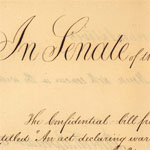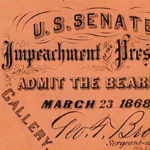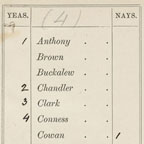
Commodity I, section 5, of the U.S. Constitution provides that "Each Business firm [of Congress] may determine the Rules of its proceedings, punish its members for hell-raising behavior, and, with the concurrence of two-thirds, expel a member." Censure is a form of discipline used past the Senate confronting its members (sometimes referred to as condemnation or denouncement). A formal statement of disapproval, a censure does not remove a senator from part. Since 1789 the Senate has censured nine of its members.

The Usa Constitution gives each business firm of Congress the power to exist the judge of the "elections, returns, and qualifications of its ain members" (Article I, section v). Since 1789 the Senate has carefully guarded this prerogative and has adult its ain procedures for judging the qualifications of its members and settling contested elections.

The Constitution grants Congress the sole power to declare war. Congress has alleged war on 11 occasions, including its first declaration of state of war with Great Britain in 1812. Congress approved its last formal declaration of state of war during World War Ii. Since that time it has agreed to resolutions authorizing the use of armed services force and continues to shape U.S. armed services policy through appropriations and oversight.

Article I, section 5, of the U.Due south. Constitution provides that each house of Congress may "punish its members for hell-raising behavior, and, with the concurrence of two-thirds, expel a member." Since 1789 the Senate has expelled simply 15 members.

The Senate has a long history of using the filibuster—a term dating dorsum to the 1850s in the United States—to delay argue or block legislation. Unlimited debate remained in place in the Senate until 1917, when the Senate adopted Rule 22 that allowed the Senate to stop a debate with a 2-thirds majority vote—a procedure known as "cloture." In 1975 the Senate reduced the number of votes required for cloture from two-thirds (67) to three-fifths (lx) of the 100-member Senate.

Under the Constitution, the Firm of Representatives has the power to impeach a government official, in effect serving as prosecutor. The Senate has the sole power to conduct impeachment trials, substantially serving equally jury and judge. Since 1789 the Senate has tried xx federal officials, including three presidents.

Congress has conducted investigations of malfeasance in the executive branch—and elsewhere in American society—since 1792. The need for congressional investigation remains a disquisitional ingredient for restraining government and educating the public.

The Constitution provides that the president "shall nominate, and by and with the Communication and Consent of the Senate, shall appoint Ambassadors, other public Ministers and Consuls, Judges of the Supreme Courtroom, and all other Officers of the The states… (Article 2, Section 2)." The Senate has e'er jealously guarded its ability to review and approve or reject presidential appointees to executive and judicial branch posts.

The Senate is governed by the Constitution, a set of standing rules, precedents established in the course of the legislative process, and special rules of process adopted by statute for particular types of legislation. These rules make up one's mind how bills and resolutions are moved towards passage, the structure of Senate committees, how debate proceeds on the sleeping accommodation floor, and how members bandage votes.

The Constitution gives the Senate the power to approve, by a two-thirds vote, treaties made past the executive branch. The Senate has rejected relatively few of the hundreds of treaties it has considered, although many take died in commission or been withdrawn by the president. The Senate may also improve a treaty or adopt changes to a treaty. The president may also enter into executive agreements with strange nations that are non subject to Senate blessing.

The Senate takes activity on bills, resolutions, amendments, motions, nominations, and treaties past voting. Senators vote in a multifariousness of ways, including scroll call votes, voice votes, and unanimous consent.











0 Response to "By Giving Members of the House of Representatives"
إرسال تعليق